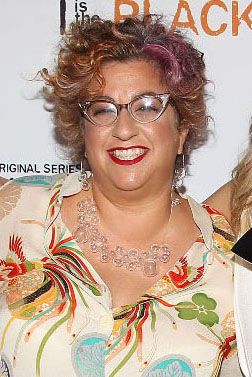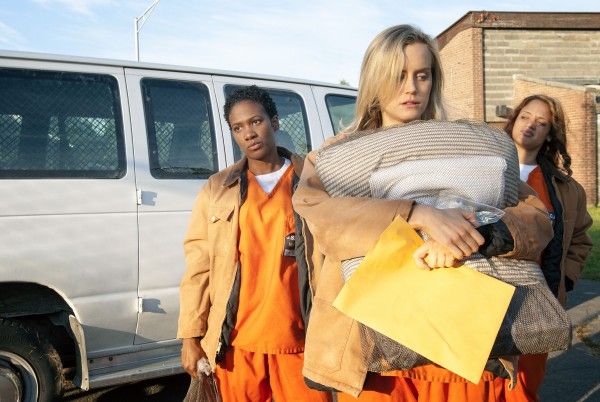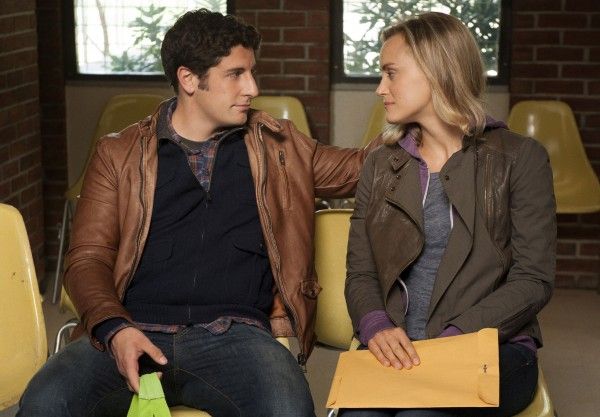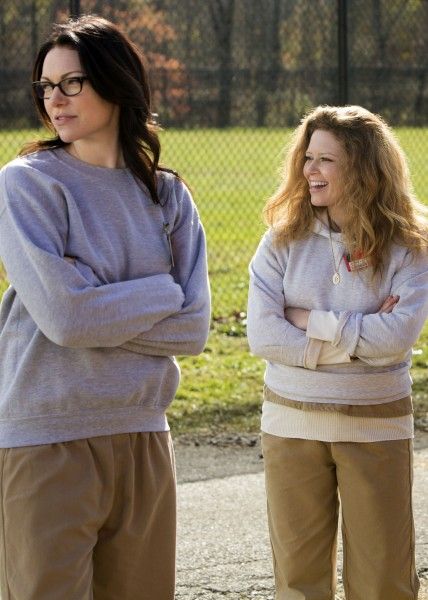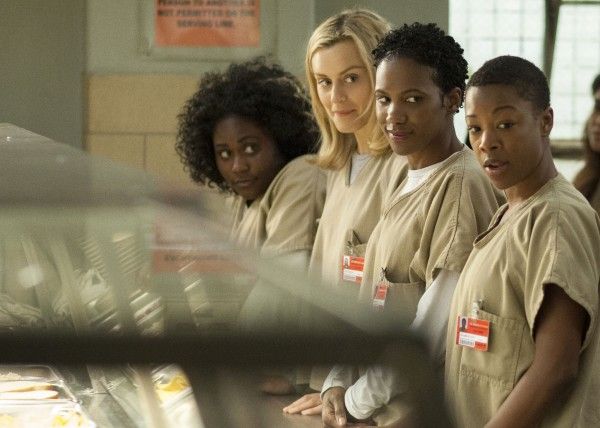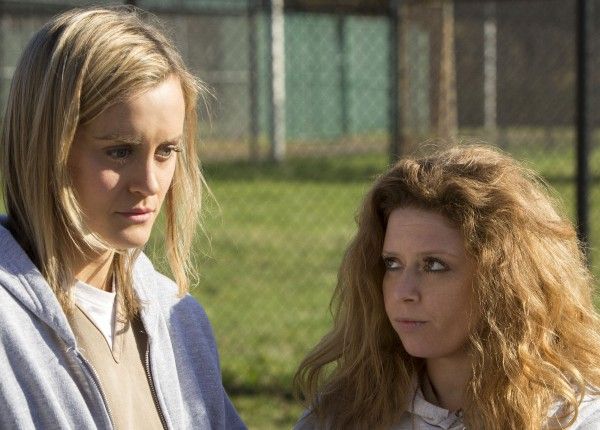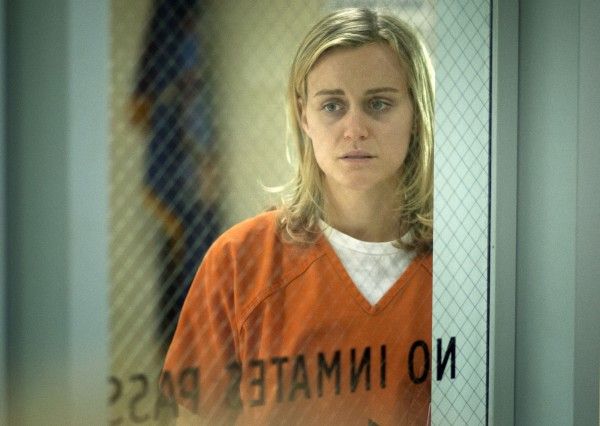From Emmy Award-winner Jenji Kohan, creator of the hit comedy series Weeds, comes the 13-episode dramedy, Orange is the New Black, available through Netflix on July 11th. Based on the popular memoir of the same name by Piper Kerman, the series stars Taylor Schilling as Piper Chapman, an engaged Brooklynite whose decade-old relationship with international drug-runner Alex (Laura Prepon) results in her arrest and year-long detention in federal prison. Piper trades her comfortable New York life with her fiancé (Jason Biggs) for an orange prison jumpsuit, and is quickly forced to question everything she knows while she serves her time, surrounded by an eccentric and outspoken group of inmates.
During both a roundtable interview at the show’s press day and a conference call to promote the series, show creator Jenji Kohan talked about why she wanted to do this project at Netflix, why the book appealed to her, how much research she did into prison life, getting to explore so many different types of women, why she wanted to include humor in the story, the graphic sex scenes, how Jodie Foster ended up directing an episode, the Regina Spektor theme song, her reaction to already being picked up for Season 2, and the other shows she’s currently developing, including a pilot at HBO. Check out what she had to say after the jump.
Question: Coming from Showtime, where you didn’t have any network restrictions, what made you decide to go to Netflix with this series?
JENJI KOHAN: Well, I spent a lot of time at the networks before Showtime. I want to be there first. It’s the next frontier. It’s how my kids watch TV, and it’s how I’m watching TV more. I remember one of my writers on Weeds got a new apartment and didn’t get cable or a dish. He just hooked his computer up to the TV. I was like, “This is it. This is how it’s happening.” To be able to be there first, I love the pioneer thing. It’s exciting to me. And they pay full rate, they’re really nice, they support the work, and they said yes. What could be bad? It’s the Wild West. You can do what you want. On the other hand, we worked a year on this and some people are going to watch it in a night and go, “We want more!” And there is something I miss about the longing and the anticipation for the next episode. But, how many times can you get exactly what you want, when you want it? Not very often. So, why not have it with entertainment? That’s what it’s fun. It’s fun! I find that’s how I’m watching, more and more. My kids go on binges, and I get sucked in. And then, it’s the middle of the night and they’re late for school, the next day.
Did you approach this show differently than Weeds, knowing that it would possibly be binge-watched, and not delivered in the normal once-a-week format? Did that change the way you framed your narrative?
KOHAN: It didn’t for a season because we were just trying to craft our episodes and get done. I’d like to think about it a little more in Season 2, but not too much because it seemed to work, the first time around. I think a good story, well told is a good story, well told, whether you’re watching the episodes all in a row or not. However, it might be fun to take a closer look at how the previous episode ends and how that end relates to the beginning of the next episode. We’re also talking a lot in the room about planting seeds that can grow over the course of the season, knowing that people might be watching them in bulk. We’d like to bury some Easter eggs and let people find them, later on.
Why do you like to do shows with female lead characters?
KOHAN: I don’t set out to write female lead shows, necessarily. I like deeply flawed characters. When they come to me, or when I’m introduced to them, I follow the stories and the people, rather than setting out to do a female lead thing. Weeds was a one-line pitch that was, “Suburban widow, drug-dealing mom.” I was like, “This is something good!” And when I read Piper Kerman’s book, I thought, “This is a way into a really interesting world. It’s the yuppie’s eye view to get you in there.” If you go to a network and say, “I wanna do prison stories about black women and Latino women and old women,” you’re not gonna make a sale. But, if you’ve got this blonde girl going to prison, you can get in there, and then you can tell all the stories. I just thought it was a terrific gateway drug into all the things I wanted to get into.
Why did the book appeal to you?
KOHAN: I fell in love with the story and I fell in love with the people she talked about in the book. Also, women in prison has always been a trope and an appealing thing. It was like, “Why hasn’t this been done yet? This should be out there.”
How did you originally come across the book?
KOHAN: A friend of mine sent me the book. She knew Piper and she knows me, and she was like, “You’ll really like this.” And then, I went after it and had to talk Piper into letting me do it. But, I screwed up the interview. She came in and I was supposed to sell myself on why I should do this. Instead, the entire time, I was like, “Well, what happened to this character? Do you still know her? What are the toilets like?” Apparently, because I had all these questions and I was enthusiastic, that’s what made her say yes to me. Other people were like, “I’ve done this, and I’ve done that,” but I didn’t even get to that part ‘cause I was mostly interested in the narrative. We just got along. It’s an amazing story. It’s a way in, where we can follow Piper, and then expand the world and tell all these different stories.
How actively involved is Piper Kerman?
KOHAN: Piper reads the scripts, and we email a lot. Most of her comments are on the more technical side, like “This wouldn’t happen. This is against the rules.” She’s been extremely respectful of our taking her story, and then veering left with it and taking it in its own direction. But, I always want her involved because she’s the mother of all this.
Aside from this being based on a memoir, what other kind of research did you do, in regard to what prison life is like?
KOHAN: We did tons of research. We went to visit a prison. We had speakers. We have read tons of supplementary material, books and articles. We are constantly emailing articles around the writers’ room. We have dipped ourselves in prison culture and lore and media, and the experience and the people. We really want to be as informed as possible.
What has most surprised you about the prison experience, that you didn’t know before you started this project?
KOHAN: The oppression of it, the sense of helplessness, and really being part of a system and a bureaucracy that is arbitrary. I never thought of the depth of losing your freedom and what that meant. And I was surprised and delighted by ways people maintain their humanity and try to survive.
What went into your decision to make the guards a lot nicer on the show than they are in the memoir?
KOHAN: You want everyone to be a full character. No one is just evil, or very few people are, hopefully. They’re characters, so you want to flush them out. You’ve got to show all sides of them. There is definitely an antagonistic relationship between guards and prisoners, and I do think it flares up. It’s something we may address more in Season 2. With Season 1, I was really more concerned about having full characters, as opposed to just villains.
How challenging was it to find the right actress for Piper, and what was it about Taylor Schilling that made you decide on her?
KOHAN: It was enormously challenging because you want that all-American girl, but you also want the cool WASP, privileged white girl. Usually, women in that package aren’t funny, and Taylor is. She’s actually a hot girl who can do comedy, which is like a unicorn. We found a unicorn. She has this beautiful, pristine exterior, and she’s got depth and range. There were a lot of people who auditioned, and she was just the whole package. We found ourselves making compromises in our head, as people came in. We were like, “She was really good, but a little too old.” You get shallow, at a certain point in the casting. I wanted that Americana ice queen for Piper, and Taylor was just a Christmas miracle.
Were there any actors that came in for a role that weren’t right for that role, but you wrote them something else?
KOHAN: Laura Prepon. She set the bar, when she auditioned for Piper. She’s such a great actress, but ultimately, I thought, “Laura Prepon in prison? I don’t worry about her.” There’s a toughness and a presence to her that wasn’t right for the character. But, she was so kick-ass that it was like, “Where are we gonna put Laura Prepon? Let’s figure it out.” And she became Alex. A lot of the other characters came out of auditions. Abigail Savage, who plays Gina, in the kitchen, auditioned for Alex. And then, Alysia Reiner, who plays Fig, the assistant warden, auditioned for everything. When the warden part came up, she didn’t even audition because I was like, “The one with the face. Just put her in it.” You remember performances, and there was some mixing and matching from the auditions. This wealth of talent that we were able to tap into, just be virtue of the fact that they’re so under-utilized, we can really excited about and wanted to create more parts for different people that we fell in love with, in casting.
What’s it like to get to explore so many different types of women, who are so under-explored on TV?
KOHAN: Even during the casting process, the pools of talent are so deep when you have a call for Latin women or black women or a middle-aged woman because they never get their shot. There’s so much talent there. We watched these auditions and could only pick one. Sometimes we would add new characters ‘cause we wanted to use another actress. There were so many people who were just waiting for something like this. The stories are great and the characters are interesting. I don’t know why you don’t see more of it. It’s a missed opportunity. They’re not shopping, and they’re not talking about the guys they’re fucking. They’re people. Yeah, they’re incarcerated, but it’s hard to find these crossroads where you can bring in all these different groups and have them all in the same place. I’m always looking for a nexus, where you can put all these diverse people together, see how they respond to one another, see what they learn about each other, and what they like and don’t like.
Did you have a plan for whose backstories you wanted to explore more than others?
KOHAN: We fell in love with different people. Looking back, we might have done it in a different order, but we got invested. We really wanted to do the flashbacks because we wanted to explore who these women were on the outside versus the inside, and get a fuller picture of the masks we wear. Also, this is our lives for a huge part of the year and we did not want to be in prison, 24/7. It was too oppressive. So, we were like, “How can we get out? Let’s see their lives, a little bit.” That was really fun.
Is there anyone you didn’t get to explore as deeply in Season 1, that you’d like to get to in Season 2?
KOHAN: Yeah, there are a bunch. I want to look into Black Cindy and Lorna and Yoga Jones, who told us a story, but you don’t see it. There are so many. Next season, I’d love to bring in new characters, just so we can tell these stories that we want to tell, if it’s not through someone already there. It’s a great control, for the production. It’s like, “If you don’t behave, you could get out of prison.” Everyone has to be nice.
Knowing that you would be telling a story set in prison, why did you decide to make the show funny?
KOHAN: First of all, I find everything funny, which is upsetting to my children sometimes, and to people in my life, in general. I think shows that are completely dramatic are a lie. People use humor to cope. That is how we deal with things. In the darkest situations, there’s humor. And if you don’t show that, you’re not being true to real life. I think it would be exhausting and depressing, to write, to watch and to live, if it was just focused on drama. It’s heavy. Also, I think the humor really highlights the pathos and the struggle. You can slam it up against drama, and it makes both shine. You spend so much of your life crafting this stuff that you want to laugh in the room. I don’t want to sit there and slit my wrists. And I think it reflects reality. People use humor to survive, even in the most horrific situations.
How did you decide how much sex you would include, and what was it like to get your actors to do graphic sex scenes?
KOHAN: I want more fucking, everywhere. That’s one of my things. It expresses everything. It’s comfort, it’s release, it’s brutality, it’s companionship. It’s so many things. We’re all doing it. We’re all thinking about it. We don’t see it enough. Part of it is a dance with the actors ‘cause it’s very vulnerable for them to do it. But if I had my way, there would be so much more, in everything. It’s so vital and integral in life, and it should be reflected in what we’re watching, if we’re reflecting our experiences. And it’s hot. I love the sex stuff, and I want more.
How did Jodie Foster end up directing an episode?
KOHAN: Jodie Foster has a project at Showtime. They bought some project that she pitched. And she’s a really smart woman, so she said, “I’ve never done TV. I don’t know how this goes.” She actually came to us and said, “Can I try? I’m about to go off and do this, so I wanna see what it’s like.” And when Jodie Foster wants to do your show, you say yes. She was awesome. It was a little bit of a transition for her ‘cause television shooting is different from movies. It’s more collaborative for the director. But, I do think she really got a sense of how it goes, or at least how it goes in my camp. Hopefully, she’ll carry that over to whatever she’s doing.
How did the Regina Spektor theme song come about?
KOHAN: I begged her to write a song and she said yes. I am a huge Regina Spektor fan. I think she’s a genius and just a lovely soul, and I wanted her voice on it. And she agreed, which is just the coolest thing, ever. She knocked it out of the park.
What was your reaction when you found out that you’d already been picked up for Season 2?
KOHAN: I think my immediate reaction was, “I’m so tired. I need a little more time.” But, it was very quickly followed up by excitement. It’s very flattering, and it’s a wonderful vote of confidence. We dream of getting to do what we do.
How many seasons can you realistically stretch this story out for?
KOHAN: Oh, my god, I can stretch this shit out for years! There’s no question. We looked at the first season, and I think we covered four months. I can keep going. I can go off with other characters. I have no problem with that. We could go for 10 seasons on this, if need be. As long as there are still interesting stories and still interesting people that we want to meet, I can keep it going. But, we all have to be invested. If the room starts getting bored or I start getting restless, then we’ll either have to change something in the show or maybe end it. But, I like the challenge of, “How can we stretch this out? Where can we go with it?” It’s an open road, especially at Netflix. You can take it anywhere you want.
Beyond this show, what are you looking to do next?
KOHAN: I have a pilot at HBO, right now, and I’m developing some other shows that I’m not quite ready to talk about. I keep busy. You’ve gotta make hay while the sun shines. There’s an expiration date on all of this stuff, so it’s like, “All right, let’s see what I can get going.” But at some point, I need to rest a little bit. I just don’t know when that’s going to be.
Orange is the New Black is available on Netflix on July 11th.


